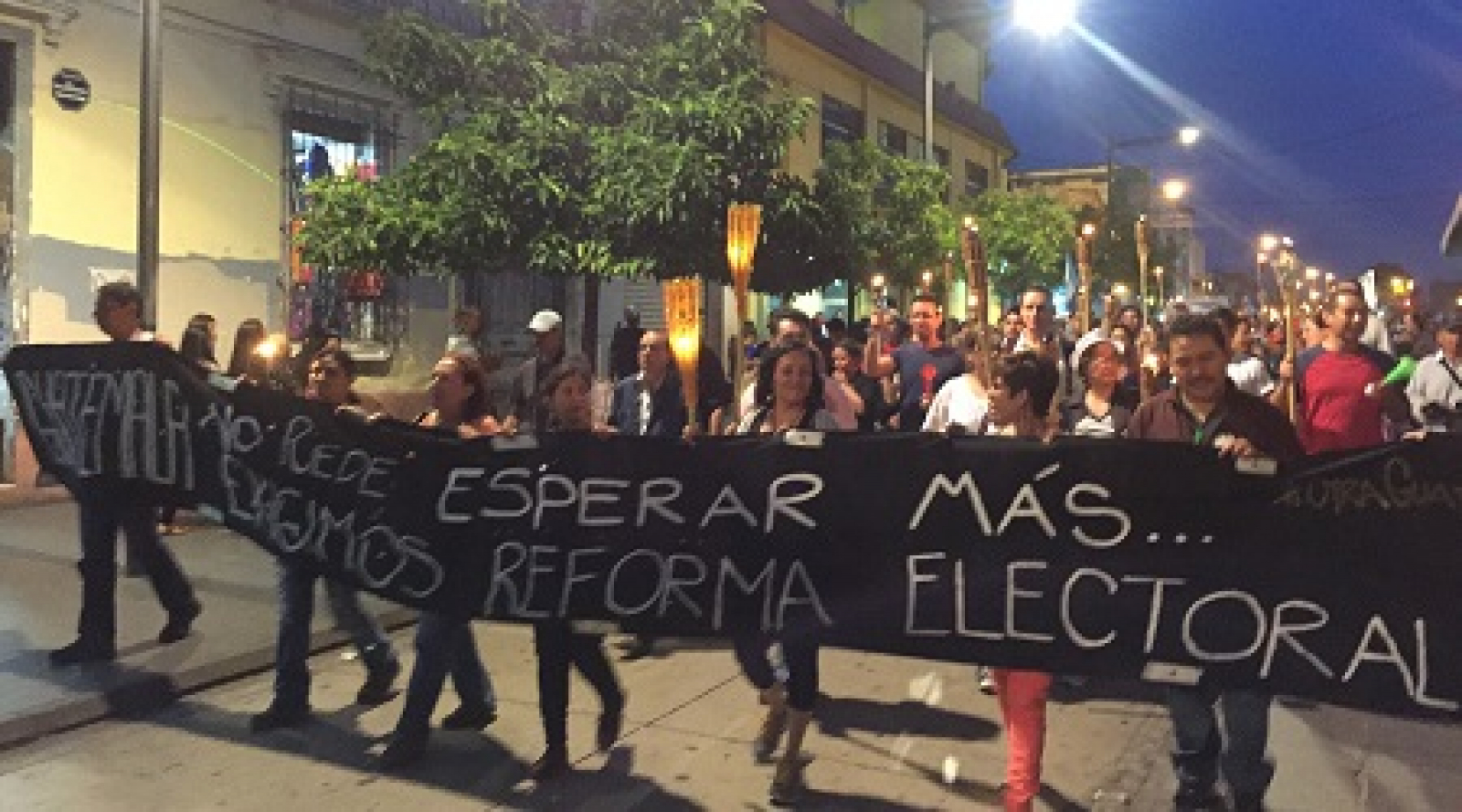
SHARE
After the third attempt in twenty years to enact reform legislation governing the country's political system, Guatemala’s Congress celebrated a big step forward this past month with the passage of highly-anticipated reforms to the Law on Elections and Political Parties (LEPP). The LEPP reforms approved in April encompass a series of measures focused on improving the country’s political and electoral system, and respond to weaknesses made apparent during the 2011 and 2015 general elections.
The ambitious reform agenda addressed weaknesses long highlighted by Guatemalan analysts. These include insufficient controls on political financing, unequal access to media coverage for candidates to public office and norms that perpetuate Guatemala’s weak party system and undermine transparency and good governance through pervasive party switching.
Since 2012, NDI has provided support to the Guatemalan Congress to improve the country’s electoral system and strengthen the transparency and effectiveness of the legislature. Through ad hoc working groups facilitated by NDI congressional representatives and civil society organizations came together regularly to debate reforms, including those encompassed by the LEPP.
This package, however, remained stalled in Congress until corruption investigations in 2015 triggered a national crisis leading to prolonged popular protests. In April 2015, the United Nations-backed International Commission against Impunity in Guatemala (CICIG) and the Guatemalan Attorney General’s Office (Ministerio Público) revealed a monumental corruption scheme that involved a criminal network of high-level government officials, dubbed La Línea (after the hotline used in the scheme), and at least $120 million in stolen tax revenue. This sparked a political crisis, which manifested into widespread public protests that lasted for more than five months. #RenunciaYa (Resign Now), a Facebook call to mobilization, brought out thousands of protesters to the streets of Guatemala City.
The protests encouraged congress to pass a new reform bill in October 2015 that included input from Guatemala’s Supreme Electoral Tribunal (Tribunal Supremo Electoral, TSE) and Guatemalan civil society. NDI supported these congressional efforts by promoting participatory dialogue between congressional representatives and advisors, civil society, and national and international experts. NDI also provided congressional representatives with assistance on key technical issues involved in drafting the legislation, including responding to citizens’ demands.
Once the legislation was reviewed and ruled on by the Constitutional Court, a new Guatemalan congress sworn in this January considered it anew. The congress approved the bill in April and now awaits presidential approval.
Major reforms in the approved law include:
-
Tighter restrictions on political campaigns, including a three-month limit on party campaigns;
-
Improvements to the system of control and monitoring of political financing, including increasing the penalties against political parties for violations administered by the TSE;
-
A more equitable system of candidate access to media, by requiring the TSE to contract media time directly, which increases equity by enabling smaller parties access to greater media coverage and reduces campaign costs for all;
-
Establishing a system for Guatemalan citizens living abroad to vote for the president and vice president; and
-
Enabling citizens to force new elections if the number of null protest votes reaches 50 percent of the total votes cast -- a demand highlighted in many of the 2015 protests.
Many members of congress and civic groups had sought more. The final reform package does not address abuses of the judicial system by political parties that bypass or stall TSE rulings, nor does it increase the budget of the TSE to implement its new mandate. The LEPP reforms also do not substantially improve the internal democracy of political parties.
The LEPP reform initially passed by the previous congress and approved by the Constitutional Court would have established a gender quota for parties to improve women’s representation in Congress as well as a provision requiring indigenous candidates in majority-indigenous regions. However, the final draft of the law that was passed by the current congress removed any mention of a quota to increase the number of women or indigenous candidates. Given that out of the 158 representatives elected to congress in 2015 only 23 are women and only 18 are indigenous, representation of all segments of society remains a challenge.
Electoral reform is a gradual process, where legislation evolves with political regimes and cultural norms. Through the recent reform process, citizens have shown that they are ready for change, they want to be involved, and that they will continue to demand more from their elected leaders. The President of Congress has already indicated that once this legislation is enacted, the legislative body will begin to address another generation of reforms.
Funding for NDI programs to support the LEPP reform process came from the U.S. Agency for International Development through the Consortium for Elections and Political Processes Strengthening (CEPPS) and the Swedish International Development Cooperation Agency through the United Nations Office for Project Services.


